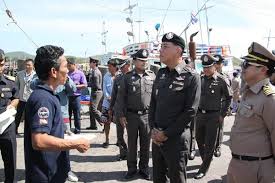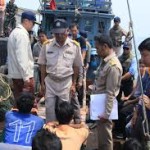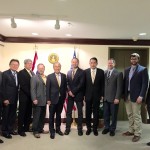
Prime Minister Prayut Chan-o-cha stood his ground and officially revoked the licenses of 8,024 fishing trawlers last week, showing no leniency in the government’s campaign to end illegal, unregulated and unreported (IUU) fishing.
The license revocations were just one element in the government’s wide-ranging and comprehensive efforts to bring Thailand’s $7-billion a year fishing industry into compliance with international environmental and labor standards. IUU fishing is a global problem. The explosive growth of Thailand’s fishing and seafood industry had outstripped the capacity of authorities to monitor and regulate it, and previous governments had not taken adequate action to keep pace with the burgeoning private sector.
With support from the present government, Thai authorities have been responding vigorously to a broad spectrum of problems and poor practices by fishing vessels and fleets. Three weeks ago, the results of compliance checks by three agencies – the Marine Department, the Fisheries Department and the Command Centre for Combating Illegal Fishing (CCCIF) – found that over 8,000 vessels in 22 provinces were in violation of licensing rules.
The trawlers were found to have obtained licenses that did not reflect the type of fishing they actually do or what types of vessels they actually are. All had failed to comply with orders to register accurately. Some had not renewed their licenses in many years. The ships were plying waters in both the Gulf of Thailand and the Andaman Sea.
Since receiving a warning earlier this year from the European Union that the Kingdom could face an import ban on its seafood products if it did not address IUU fishing, the government has been tackling the issue on all fronts. Thailand has passed a National Action Plan on IUU fishing, plus a Fishery Management Plan to cover fishing in Thai waters and fishing by Thai vessels in waters beyond Thailand, and the first rewrite of the National Fisheries Act, the main law government fisheries, since 1985. The National Action Plan prescribes approaches and regulations to make fisheries sustainable and protect marine resources.
It is also designed to protect the environment and the livelihoods of coastal fishermen, who are most often small scale and already fishing in a sustainable manner.
The government established the Command Center for Combating Illegal Fishing, which oversees and coordinates the efforts of several departments involved in regulating and enforcing rules and laws in the industry.
All vessels 30 tons and larger are now required to install tracking systems so that Thai authorities can keep tabs on their movements and locations and take serious action if they are fishing in restricted zones.
A port-in/port-out registration and monitoring system has also been put in place. Destructive fishing gear and practices have been completely banned, and fishing in certain areas limited to specific days so that marine life and resources can be replenished.
The new regulations have sparked several protests by fishing ship owners and crews, demanding that the Prime Minister rescind the new regime and allow them to do business as usual. The Prime Minister has stood firm in the face of the protests.




